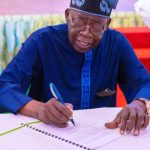Change your focus, the future of fast-growing economies is in the knowledge economy – Osinbajo tells States
Oct. 15, 2021
Vice President, Yemi Osinbajo has called for a new mindset in the way the affairs of State Governments are managed, suggesting increased investments in local talents, more focus on the knowledge economy, and greater attention to niche areas of comparative advantage.
According to Osinbajo, this way States can attract investors and boost their economic development.
In a statement on Thursday, Laolu Akande, spokesman to the VP said Osinbajo stated this in his keynote address at the Ekiti State Investment and Economic Development Summit and the third anniversary celebration of the government of the State.
Speaking on the theme of the Summit: “Investment Attractiveness and Economic Development: Lessons for Sub-nationals”, the Vice President noted that “the future of fast-growing economies is in the knowledge economy,” while also referencing Ekiti State’s potential in agriculture and dairy production, and technology.
Commending the farsightedness of the Ekiti State Governor with the planned establishment of the Technology Special Economic Zones, the VP advised that “for a digital SEZ to be successful, it must be attractive to digital companies; that means there must be high-quality, well-trained local talent.”
“I’m glad to hear already that on account of the reduction in charges for laying of cables for broadband connectivity, the State is already attracting investments in the laying of cables,” he said.
The Vice President added that despite Ekiti State being small in terms of population and federal allocation, the State has a bigger economy and GDP than countries like São Tomé, Gambia, Cape Verde, and Seychelles.
In this regard, the VP noted that a collective change of mindset for States is vital towards leveraging comparative advantages and achieving more economic growth.
“Thinking differently, there is a need for a sub-national to think like a sovereign State. You have a bigger GDP and even more revenues than many nations. There is a different mindset when you are sure of a monthly allocation of cash at least enough to pay salaries, whether you generate income or not. This is the challenge. The so-called Dutch disease, one becomes complacent.
“But what if you had to take responsibility for all those who reside within your borders, pay all salaries, from internally generated revenue?”
The VP recalled how Lagos State improved its IGR from N600million monthly in 1999/2000 to about N45billion today. He said the illegal seizure of the allocations to the State by the then Federal Government was the shock that forced the State to rethink.
Speaking further, Prof. Osinbajo noted that although a State within a Federation is not a nation, it must behave like one, to further boost its economic development.
“The economy of the sub-national is a peculiar animal. The State within the Federation is not a nation, but it must behave like one, it derives some resources from the Federal pool, and generates some income, the overall sum will provide infrastructure and services to the community. The size of the sum and the quantum of opportunity available to provide livelihoods for the populace will depend on how the State enables local and external investors, small and large to put their resources into business and commercial activity business in the State, the VP observed.
“the funded portion of the State’s budget is after all a mere fraction of the sum total of economic activity or income-generating activity, formal or informal within the State. So, the attractiveness of a State to commerce is a radical issue.”
He asserted that “the very lives and livelihoods of the people within the borders of the State, whether the people will live prosperous and happy lives, be educated, have access to affordable medical care, depends on it.”
Similarly, Osinbajo highlighted how Federal and State governments can benefit from a private-sector led economy, noting that the private sector-led model is the right way to go, as “business is the business of the private sector, while governments should as much as possible facilitate, or at best, collaborate.
“An excellent example is the formerly State-Owned, Ikun Dairy Farms at Ikun Ekiti. After 40 years of inactivity, the State Government divested 76% of its shareholding to a private dairy company, Promasidor, resulting in a company that is now producing over 80,000 liters of milk per month from a herd of about 500 cows.
“There is also the recent concessioning of hospitality facilities such as the iconic Ikogosi Warm Springs, affirming the same principle (of collaboration). This is a very important principle, the idea that it is the private sector that really should lead the economy,” he said.
States must find ways to harness the potential of their people through STEM education in order to become a more attractive destination for investors, noting that the key to the knowledge economy is education, he declared.
“Gone are the days when you could argue that you should be an attractive destination for investment because you have cheap labour. Today, well-trained technology and innovation talent is the game-changer.
At the event were the governors of Lagos State, Babajide Sanwo-Olu; Edo State, Godwin Obaseki; Kaduna State Mallam Nasir El-Rufai and the Deputy Governor of Ondo State Lucky Aiyedatiwa.
Also present were the Minister of Industry, Trade and Investment, Otunba Niyi Adebayo; Special Advisers to the President: Economic Matters, Dr Adeyemi Dipeolu; Political Affairs, Sen. Babafemi Ojudu; and Social Investment Programmes, Maryam Uwais.
Ahead of the summit, the Vice President had commissioned the State’s Civic Centre, which hosted the meeting.
The VP was accompanied by the Ondo State Deputy Governor, the Industry, Trade and Investment Minister, and also the Women Affairs Minister, Dame Pauline Tallen, and the Niger Delta Affairs Minister of State, Senator Tayo Alasoadura.








